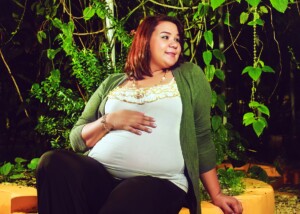
You’re older, you have no kids but desperately want a baby, but you’ve been told to lose a lot of weight before you can have IVF.
By the time you lose the weight, you fear you’ll be “too old” to be considered for IVF or, at least, your older age will be an issue with success.
Biological Clock Ticking, Older Woman Wants Baby but Is Too Overweight for IVF
There was an obese woman, 39, who’d never had any children but desperately wanted to get pregnant.
She’d been trying naturally for about a year or so, without success, and finally started looking at IVF as an option.
At some point she learned that her weight was a contraindication.
Readers of her story were wondering why she had never tried for a baby earlier in life, but that portion of her story was omitted.
However, this situation can also apply to any older obese woman who’s already had kids earlier in life, but now in her older age wants to have another baby yet has been unable to conceive despite long-term attempts.
The 39-year-old feared that by the time she lost all the weight required to undergo IVF, she’d be in her early 40s.
She said she had tried “everything” to lose weight in the past but failed, and was desperate for a fertility doctor to just give her the treatment regardless of her weight.
So what should she do?
“I would do IVF with embryo banking and then take the appropriate steps to lose weight including surgery,” says Ralf Zimmermann, MD, medical director of Neway Fertility, one of NYC’s leading fertility centers specializing in customized and affordable natural fertility treatments.
“Implantation is not affected by age of uterus, but weight affects implantation and pregnancy.”
Embryo Banking
This is storing embryos that were created via IVF in a special “bank” until the patient is ready (healthy enough) to have the embryo placed inside her uterus.
Embryo banking is also called embryo stockpiling or staggered IVF, and is the solution for delayed child-bearing. Also called cryopreservation, embryo banking involves freezing fertilized eggs.
If an obese woman wants to undergo bariatric surgery for weight loss, she can first have mature eggs retrieved from her ovaries and fertilized in vitro, then banked, and then she can undergo the weight loss surgery.
The bariatric surgery would be the fastest way to lose weight, especially when combined with cardio workouts and a strength training regimen.
Egg production can be enhanced with ovarian stimulation drugs. The banked embryos are kept frozen until the patient has lost enough weight for implantation and gestation.
The fertilized eggs, prior to freezing, will also be tested for any genetic defects.
In short, embryo banking is the solution to the 39-year-old woman, or any woman, who believes she’ll never get pregnant due to a combination of biological age ticking, fertility issues and obesity.
Now in theory, while the embryos are being banked, she may try to lose weight non-surgically, and after 12 months, still have not lost anywhere near the amount of weight required for a successful embryo transfer and pregnancy.
At some point she is going to have to make a very important decision: keep trying to lose weight with diet and exercise alone, or undergo bariatric surgery.
Certainly, an obese woman in her late 30s who desperately wants a baby would rather have one at age 41 than 48.
For women over 40, only a few eggs may be retrieved. She can undergo a second stimulation cycle to produce more eggs for fertilization.
With more banked embryos, there’s a better chance of ultimately giving birth to a healthy baby, since numerous embryos allow doctors to have a better selection for transfers.
The decision to do back-to-back stimulation cycles is determined on a per-patient basis.

Ralf Zimmermann, MD


























